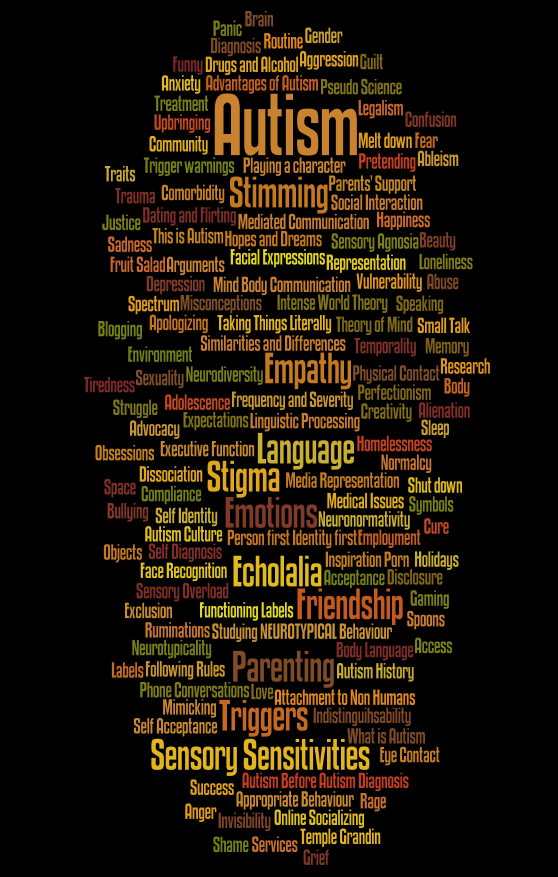 I got a bit of an urge to get creative with this post. Maybe it’s the holiday season.
I got a bit of an urge to get creative with this post. Maybe it’s the holiday season.
Well, to be honest, I’m not sure copy-pasting a list of words into a word-cloud-generator counts as being very creative, but it is a change from the usual flux of words that normally fill this blog. And I do like what came out. In a way, this word-cloud is a pretty decent visualisation, I think, of my work in the past 18 months or so. And I’ve already written about how difficult I find it to visualise any aspect of my study.
This pile of words you see here is compiled of the themes of my study. Basically, every interview I did, every note I had taken, every blog-post I had read, I categorised into several themes. So for example, if Alan had told me about how his friends helped him when he became overloaded by the music and lights in a hotel lobby, I would classify that story in my notes as relating to sensory sensitivities, sensory overload, and friendship.
So the list you see here is basically a list of all the major topics my interlocutors have been discussing. The bigger ones are the ones which were more common than others. But if any topic appears here, this already means it was quite common.
In other words, this is the list of things my interlocutors – namely autistic adults – were mostly occupied with. These were the things that concerned them, interested them or worried them. So in a sense, I find this to be a relatively decent approximation of what being autistic might mean. Well, in some roundabout way, anyway.
Of course, not all these topics are interesting or relevant to everyone who is autistic. That almost goes without saying. But the whole project of trying to understand autism – and this is true whether you’re a neuroscientist, teacher, advocate or anthropologist – involves making some generalisations. Nothing applies to everyone, and some things may only apply to a few and still be important. But judging from all I have learnt so far, this word-cloud, as a whole, represents quite reasonably what autism seems to mean to autistic people.
It represents what aspects of being autistic seem to matter most.
I should add that this list is of my own making, in the sense that an interlocutor of mine did not necessarily have to utter the word ‘loneliness’ or ‘exclusion’ for me to attribute those specific themes to her account. So for example, she might have been talking about struggling to find company, or being rejected by a social group where she tried to fit in. Then it would be my judgement to deem that reflection as indicative of an experience of exclusion or loneliness. In that sense, I have as much a role in shaping this list of themes – if not a bigger role, even – than my interlocutors did. There’s something just a bit problematic, even reductionist here. I’ll admit that. Every individual’s experience is singular and unique, and lumping unique stories into broad categories is creating a pretty artificial lens through which to view things. But then again, this grouping is only meant for my own ease and convenience when searching through my notes, trying to figure out what questions I should be asking about autism, and what sort of material I might use to try and answer them. So these themes are really mere signposts. Just my own way of creating some sense of order for myself amidst the many rich and nuanced stories I’ve been collecting.
I like this list, because it paints a picture of autism as neither inherently good nor bad. As neither merely a neurological condition nor as just as social category. As both something one is and as something one does. And it colours autism, as any text dealing with it always should, with the multifacetedness and nuance that it deserves. And also, it’s pretty.
Happy Christmas, happy Hanukkah, and a good new year.
Related Posts:
One thought on “December Clouds”